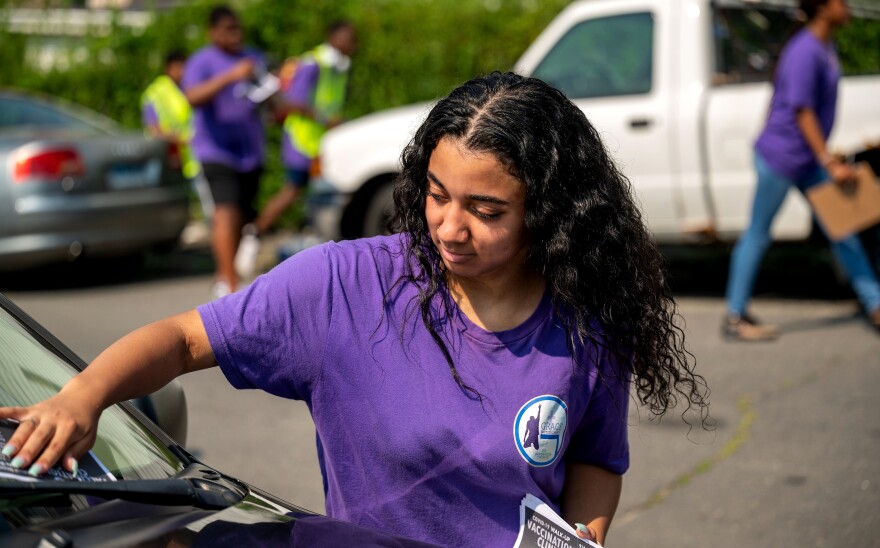Lately, Elise Taylor is logging 10,000 steps a day, a lot of them on hills and up to front doors in Waterbury to ask if residents are interested in taking the COVID-19 vaccine.
On an overcast Friday in July, most knocks go unanswered. But when she sees a sign of life, a woman comes to the door and tells Taylor that she’s already gotten her vaccine.
Taylor responds with glee, “Oh great! I think we left an information flyer right at your door, so if you do know anyone who’s not vaccinated, you can share it with them? Thank you!”
As she walks back down the steps, she says, “That’s how it’s done.” And she’s off to the next door with a handful of flyers.
A special grant is giving these teens a very “COVID” kind of summer job: They’re going door-to-door to sign up residents for the vaccine. Just under half the population is unvaccinated in Waterbury, creating a challenge and an opportunity.

Taylor is part of Grace Baptist Church’s street team. She and seven other teens load into a van from the church parking lot each morning at 9:15 a.m. They walk up and down the hills of the city all day -- with a break for lunch -- putting flyers under doors and car windshield wipers and having conversations with residents.
“And if people are a tad bit wary,” Taylor said, “we do provide people for them to talk to.” She said that she tries to “... you know, [do] my little bit. But we have people back at the church that do walk them through their worries.”
Waterbury was awarded over $2.7 million by the Connecticut Department of Public Health as part of the Vaccine Equity Partnership.
With the grant funds, Grace Baptist Church also runs a phone bank and a series of weekend vaccine events with food trucks and music.

Pastor Kristopher Reese estimates his church is close to 90% vaccinated.
“Why? Because their leader, their pastor, has been pushing it and pushing it,” Reese said.
But Waterbury still has work to do. Just under half the population has had a first dose. Within the city, Native American and Black populations have the lowest vaccine uptake at 30.9% and 36.5%, respectively. Hispanic, Asian or Pacific Islander and White populations fare slightly better but are still below the statewide average: 42% of Hispanics in Waterbury have gotten at least one dose, while 44.1% of Asian or Pacific Islanders and 43.5% of whites have done so.
Grace Baptist is one of eight organizations in the city that received funding to make those percentages more equitable. The church was awarded $991,560. The other groups include Community Health Center, Greater Waterbury Health Partnership, Hispanic Coalition of Greater Waterbury, Madre Latina, New Opportunities, Waterbury Police Activity League and the YMCA of Greater Waterbury.
The church can arrange for in-home shots, transportation to vaccine clinics or doctor’s appointments. But that might be the easy part of the work.
Reese said that he tries to keep his group “realistic about the challenges because of the simple fact that for every positive message, there’s a hundred negative messages.”
Social media plays a big part in the hesitancy, according to Reese. He hears doubt about the speed of developing the COVID vaccine, compared to the long wait for a cure for cancer. More conspiratorial ideas come up too, like the contention that the vaccine has poison or a chip in it.
Ginne-Rae Clay, president of the Greater Waterbury NAACP, is program coordinator for the effort.
“People want to talk about it a little bit,” Clay said. “They wanna know your experience, if you’ve had the vaccination, who else do you know who’s had the vaccination.”

Dr. Kenneth Cook, the canvass coordinator and a business professor at Post University, draws from his experience working as a census canvasser. The timeline for trust, Cook said, isn’t a straight line.
“The more you talk to them, their body language goes from this, to this, to [this]. You start giving them the facts, [and] you know a change is coming. We just gotta give them a little time ... it’s a maturation, and they’ll come around,” he said.
Cook said there are about 40,000 doors to knock on in Waterbury, and he’d like the team to get to 75% to 80% of them.
“One of the things we can’t do, that we shouldn’t do, is pass judgment on those who decide not to get the vaccine,” Clay said, “but continue to have the conversation you know with those folks that are not gonna get the vaccine.”
Dr. Rocio Chang-Angulo, a psychiatry professor at UConn Health, said challenging or guilting unvaccinated people won’t work for any group. For populations of color, trusting the health system is tough, during a public health emergency that is still having a greater impact on their populations.
“There is significant distrust in the services that are supposed to protect us,” Chang-Angulo said “and ... I would like people to consider that before they make some judgments.”
What the unvaccinated need, according to Chang-Angulo, is someone who can listen to their concerns and explain the vaccine in simple terms.

On the streets of Waterbury, Elise Taylor said she doesn’t even get that chance in many cases.
“The only thing that you can do is just say, ‘Here’s the information, take it if you will.’”
Taylor has encountered misinformation, stubbornness and lying -- and people who she believes don’t want to be judged for not getting vaccinated. And so she doesn’t.
“When you judge people for their position on a certain thing,” Taylor said, “it doesn’t push them towards your side. All it does is make them believe their beliefs to a greater extent.”
Taylor knows she’s there to be just one positive message of the many it may take for some Waterbury residents to schedule that first vaccine appointment.




